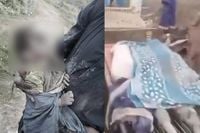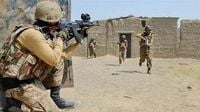In the early hours of September 22, 2025, a devastating explosion rocked the Tirah Valley in Pakistan’s Khyber Pakhtunkhwa province, near the Afghanistan border. The blast, which occurred in the Akakhel area, resulted in the deaths of at least 24 people, including women, children, and militants. Yet as the dust settled, confusion and controversy erupted over what exactly had transpired, with conflicting narratives from officials, politicians, and local residents fueling a heated national debate.
According to the Associated Press and multiple police sources, the explosion was triggered by bomb-making materials stored in a compound used by Pakistani Taliban fighters—specifically, an improvised explosive device (IED) factory set up by commanders Aman Gul and Masood Khan. Station House Officer Zafar Khan of Tirah police told AP that the compound was being used as a factory for producing roadside bombs, and that the blast killed 14 militants along with 10 civilians, some of whom were women and children. The explosion’s force destroyed around five nearby houses, causing what police described as “collateral damage” to families living in the densely populated area.
Local eyewitnesses corroborated that militants had established the IED factory right in the heart of the civilian neighborhood. The tragedy, they said, was compounded by the militants’ use of innocent people as human shields—a grim tactic that has become all too familiar in the region’s long-running conflict. As one local tribesman put it, “Once again Khawarij resorted to their well-known cowardly tactics by using innocent civilians, their houses and mosques as human shields.”
But the official narrative was immediately challenged by several provincial leaders and opposition politicians. National Assembly member Iqbal Afridi, along with fellow parliamentarian Sohail Khan Afridi—both from the Pakistan Tehreek-e-Insaf (PTI) party, which governs Khyber Pakhtunkhwa—alleged that the deaths were not the result of an accidental explosion, but rather of aerial bombings carried out by security forces as part of a counter-terrorism operation. “It was the security force’s aircraft that carried out the shelling. It’s their shelling that killed 23 people,” Iqbal Afridi told AFP. Sohail Khan Afridi echoed this claim, describing the raid as “nothing less than an attack on unarmed civilians” during a session of the provincial assembly.
The Khyber Pakhtunkhwa government, led by Chief Minister Ali Amin Gandapur, condemned the civilian deaths—regardless of their cause—and announced compensation of Rs10 million for each victim’s family. In a statement issued after a high-level meeting with public representatives and military officials, the chief minister called the incident “regrettable and condemnable,” adding, “Martyrdom of civilians as a result of operations against terrorists is unacceptable.” The session also outlined plans for a jirga (tribal council) involving local elders, political leaders, and military officials to develop a new strategy for peace and order in Tirah, taking inspiration from the model used in Bajaur.
The Human Rights Commission of Pakistan (HRCP) quickly weighed in, expressing deep shock at the civilian deaths and demanding an immediate and impartial inquiry. “The HRCP is deeply shocked to learn that a number of civilians, including children, have been killed, allegedly as a result of aerial bombing in Tirah, Khyber district, Khyber Pakhtunkhwa,” the organization posted on X (formerly Twitter). The HRCP’s statement continued: “The state is constitutionally bound to protect all civilians’ right to life, which it has repeatedly failed to secure.”
Adding to the confusion, a senior police officer in the area told AFP on condition of anonymity that “the jets targeted four houses, which were completely destroyed,” though he did not specify who carried out the attack. Meanwhile, police and security officials continued to insist that there had been no airstrike, calling such claims a “smear campaign” designed to protect terrorists and undermine Pakistan’s sacrifices in the war against terrorism. “The reality is clear that Pakistan’s operations are solely targeted against the menace of Khawarij terrorists, who continue to destabilize it through bloodshed and deceit,” police said in a statement to Daily Times.
On the ground, the human cost was painfully clear. Thousands of mourners attended the funerals of those killed and later rallied against the government, demanding justice for the dead. Footage circulating online, shared by local journalists and social media users, appeared to show bodies lying amidst rubble, including those of children. Rescue teams searched for more victims, raising concerns that the death toll could climb higher.
The Tirah Valley and the wider Khyber Pakhtunkhwa region have long been battlegrounds in Pakistan’s struggle against militant groups like the Tehrik-e-Taliban Pakistan (TTP), who are allied with the Afghan Taliban. The TTP has stepped up attacks on security forces in recent months, prompting intensified military operations in Khyber, Bajaur, and other northwestern districts. According to New Indian Express, between January and August 2025 alone, Khyber Pakhtunkhwa reported 605 terror incidents resulting in at least 138 civilian and 79 police deaths. The area remains a stronghold of TTP militants, who often live among civilian populations and operate training and bomb-making facilities.
Amnesty International and other human rights groups have repeatedly flagged what they describe as “an alarming disregard for civilian life” in the province, particularly in the wake of repeated drone strikes and counter-terrorism operations. The HRCP’s call for an impartial inquiry into the latest incident reflects broader concerns about the lack of accountability and transparency in Pakistan’s ongoing fight against militancy.
As of now, no official statement sharing the full details of the incident has been issued by the relevant authorities. Khyber Deputy Commissioner Bilal Shahid and District Police Officer Mazhar Iqbal have not offered any response. Meanwhile, KP Assembly Speaker Babar Swati has called for a “transparent and immediate investigation into the incident, identify those responsible, and not only provide immediate relief and compensation to the affected families but also take comprehensive measures for their rehabilitation.”
The tragedy in Tirah Valley has once again exposed the complexities and dangers of counter-terrorism operations in Pakistan’s northwest, where militants, civilians, and security forces are locked in a deadly struggle. Whether the blast was a tragic accident or the result of military action, the need for accountability, transparency, and protection of civilian life has never felt more urgent.


